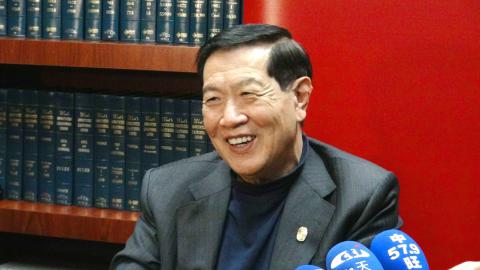Henry Lee (李昌鈺), a US-based forensic scientist, said on Monday that the shooting of former president Chen Shui-bian (陳水扁) on the eve of the presidential election in 2004 was a minor case, but it created a lot of pressure.
The shooting on March 19, 2004, in which Chen’s abdomen was wounded, was a minor case compared with others he had dealt with, such as war crimes in Croatia and Bosnia and a review of former US president John Kennedy’s assassination, Lee said at a press conference in Los Angeles on the eighth anniversary of the “319 Incident.”
However, Lee said he faced great pressure, which was mostly unnecessary, in the Chen case because of its political implications.

Photo: CNA
Lee was asked to assist in the investigation of the incident, in which a bullet grazed Chen’s abdomen and another slightly injured then-vice president Annette Lu (呂秀蓮) at a presidential election campaign motorcade in Tainan.
In a report submitted in August 2004, Lee concluded that the shooting was not a planned assassination attempt, in which case “a more powerful weapon than a homemade pistol would have been used.”
Some pundits said the incident helped Chen of the Democratic Progressive Party (DPP) gain sympathy votes that earned him a razor-thin victory over the Chinese Nationalist Party’s (KMT) candidate, Lien Chan (連戰).
On Monday, Lee gave a Power-Point presentation that detailed aspects of the shooting, such as the bullets used, their trajectory and the type of gun from which they were shot.
As a forensic expert, Lee said, his work is to review all available evidence and reach a conclusion.
He said the bullets that wounded Chen and Lu came from the same gun, which was traced to the man who made it, Tang Shou-yi (唐守義).
It was last used by Chen Yi-hsiung (陳義雄), who died under suspicious circumstances, Lee said.
Chen Yi-hsiung’s body was found in a pond on March 28, 2004. Lee said the body was cremated almost immediately after death, so it could not be determined whether Chen Yi-hsiung had died in the water.
The shooting case was officially closed after investigators concluded that Chen Yi-hsiung had acted alone.
Last week, Lu called on the government to reopen the case, and the DPP legislative caucus on Monday proposed setting up a special review committee to re-examine the incident.

Alain Robert, known as the "French Spider-Man," praised Alex Honnold as exceptionally well-prepared after the US climber completed a free solo ascent of Taipei 101 yesterday. Robert said Honnold's ascent of the 508m-tall skyscraper in just more than one-and-a-half hours without using safety ropes or equipment was a remarkable achievement. "This is my life," he said in an interview conducted in French, adding that he liked the feeling of being "on the edge of danger." The 63-year-old Frenchman climbed Taipei 101 using ropes in December 2004, taking about four hours to reach the top. On a one-to-10 scale of difficulty, Robert said Taipei 101

Nipah virus infection is to be officially listed as a category 5 notifiable infectious disease in Taiwan in March, while clinical treatment guidelines are being formulated, the Centers for Disease Control (CDC) said yesterday. With Nipah infections being reported in other countries and considering its relatively high fatality rate, the centers on Jan. 16 announced that it would be listed as a notifiable infectious disease to bolster the nation’s systematic early warning system and increase public awareness, the CDC said. Bangladesh reported four fatal cases last year in separate districts, with three linked to raw date palm sap consumption, CDC Epidemic Intelligence

Two Taiwanese prosecutors were questioned by Chinese security personnel at their hotel during a trip to China’s Henan Province this month, the Mainland Affairs Council (MAC) said yesterday. The officers had personal information on the prosecutors, including “when they were assigned to their posts, their work locations and job titles,” MAC Deputy Minister and spokesman Liang Wen-chieh (梁文傑) said. On top of asking about their agencies and positions, the officers also questioned the prosecutors about the Cross-Strait Joint Crime-Fighting and Judicial Mutual Assistance Agreement, a pact that serves as the framework for Taiwan-China cooperation on combating crime and providing judicial assistance, Liang

US climber Alex Honnold left Taiwan this morning a day after completing a free-solo ascent of Taipei 101, a feat that drew cheers from onlookers and gained widespread international attention. Honnold yesterday scaled the 101-story skyscraper without a rope or safety harness. The climb — the highest urban free-solo ascent ever attempted — took just more than 90 minutes and was streamed live on Netflix. It was covered by major international news outlets including CNN, the New York Times, the Guardian and the Wall Street Journal. As Honnold prepared to leave Taiwan today, he attracted a crowd when he and his wife, Sanni,